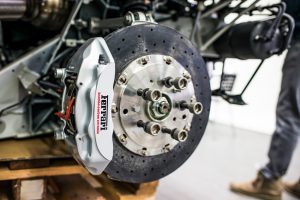How long do brake pads last?
 Brake pads are an essential component of any vehicle. The brake pads are responsible for your safety and the proper operation of your braking system. So, how long do you think brake pads will last?
Brake pads are an essential component of any vehicle. The brake pads are responsible for your safety and the proper operation of your braking system. So, how long do you think brake pads will last?
We’re to help you figure out how long brake pads last, what causes them to wear out, and what factors influence how long they last.
What is a Brake Pad?
Brake pads are located between the brake shoe and the brake drum. The brake caliper contains brake pads. When you press the brake pedal, the caliper applies pressure to the brake pads, which clamp on the brake disc, causing your tires to slow down.
Without working brake pads, other components of your braking system can quickly wear out. Brake pads will wear out with time and will need to be replaced regularly to ensure that the braking system performs properly.
How long do brake pads last?
This question has no definitive answer. The brake pad can last anywhere from 20,000 to 70,000 miles, according to various car manufacturers. However, most car owners repair their brake pads after 40,000 miles on average.
Some brake pads can wear out after only 20,000 miles, while others will last up to 70,000 miles. It’s just a matter of when and how it breaks down.
The following are some of the elements that influence brake pad longevity:
- The Driving Environment. Driving in locations where there is a lot of braking, such as mountainous routes, or in a place where there are a lot of stops, such as in town or stop-and-go traffic, will wear down the brakes faster.
- Types of Brake Pads. There are three basic varieties of brake pads, each with its own set of materials. Organic brake pads have the shortest lifespan of any of the three types of brake pads and are prone to brake fade. Semi-metallic brake pads (metallic brake pads) are designed to outperform organic brake pads in terms of durability and braking reaction. A semi-metallic brake pad should last roughly 50,000 kilometers. Ceramic pads have the longest life expectancy. They are typically seen in premium vehicles and are designed to provide a comfortable braking experience.
- Your Driving Habits. When you’re driving quickly and abruptly press the brakes, it takes a lot of stopping power to bring your vehicle to a standstill. Increased brake wear is a common result of this. Driving your car slower means your brake pads won’t have to work as hard to bring your vehicle to a halt, and you can expect your brake pads to last longer as a result.
- Condition of Brake Rotors and Calipers. Your brake rotors and calipers might easily impact your braking pad if they aren’t in good shape. Brake pads can wear out faster than they should due to a jammed brake caliper or a deformed rotor.
When to Replace Brake Pads
Check your brake pads every time you change your oil, and read your vehicle’s service manual for recommended replacement intervals. To extend the life of the other parts of the braking system, it’s better to change brake pads before you notice any signs.
- Replace the brake pads when the brake pad thickness is the same as the backing plate thickness, and before the pad wear indicator makes a squealing noise.
- If the brake pedal vibrates or feels like it’s squeezing when you depress it, have them check right away. Make sure you have enough brake fluid if the brake pedal feels mushy.
- If your brake pads are already worn out, you’ll hear metal-on-metal contact between the rotor and the caliper.
If your vehicle exhibits any of the above signs, make sure to replace the brake pads as soon as possible, preferably with the same material.
